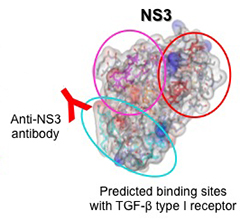Dec. 6, 2013
Hepatitis C virus protease enhances liver fibrosis by mimicking growth factor

Chronic hepatitis C virus (HCV) infection is one of the main causes of liver cancer, cirrhosis and liver fibrosis, a process largely mediated by the overexpression of transforming growth factor (TGF)-β and collagen. However, the molecular mechanism by which HCV induces liver fibrosis was not fully understood.
NS3 is a serine protease encoded by the HCV genome that cleaves the HCV polyprotein to generate mature viral proteins required for viral replication.
Researchers from the RIKEN Centre for Life Science Technologies report that NS3 mimics TGF-β2 and functions by directly binding to and activating TGF-β type I receptor (TβRI), thereby enhancing liver fibrosis.
Tumor necrosis factor (TNF)-α facilitates this mechanism by increasing the colocalization of TβRI with NS3 protease on the surface of HCV-infected cells.
The researchers show that an anti-NS3 antibody against computationally predicted binding sites for TβRI blocked the TGF-β mimetic activities of NS3 in vitro and attenuated liver fibrosis in HCV-infected chimeric mice.
The study is published in Scientific Reports, doi:10.1038/srep03243
